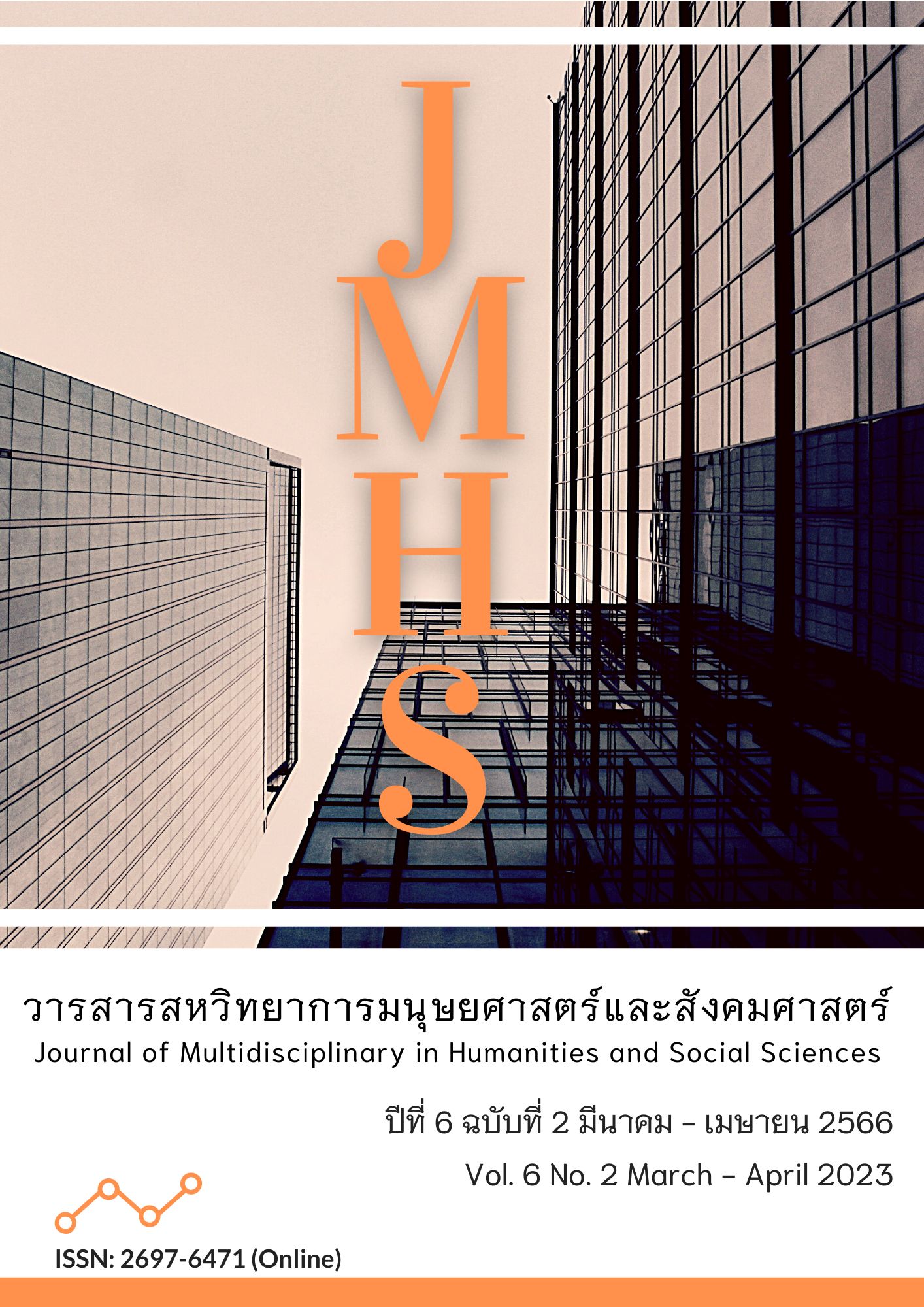ความยุติธรรมในองค์กรและคุณภาพชีวิตในการทำงานที่มีผลต่อความผูกพันต่อองค์กรของบุคลากรเทศบาลเมืองบ้านสวน จังหวัดชลบุรี
Main Article Content
บทคัดย่อ
บทความนี้มีวัตถุประสงค์เพื่อ 1) ศึกษาความผูกพันต่อองค์กรของบุคลากรเทศบาลเมืองบ้านสวน 2) เปรียบเทียบความผูกพันต่อองค์กรของบุคลากร จำแนกตามลักษณะส่วนบุคคล 3) ศึกษาความสัมพันธ์ระหว่างการรับรู้ความยุติธรรมในองค์การและความผูกพันต่อองค์การของบุคลากรเทศบาลเมืองบ้านสวน 4) ศึกษาความสัมพันธ์ระหว่างคุณภาพชีวิตในการทำงานและความผูกพันต่อองค์การของบุคลากรเทศบาลเมืองบ้านสวน เป็นการวิจัยแบบผสานวิธี กลุ่มตัวอย่างที่ใช้ในการวิจัยครั้งนี้ คือ พนักงานเทศบาล ลูกจ้างประจำ และพนักงานจ้างของเทศบาลเมืองบ้านสวน จำนวน 219 คน โดยในส่วนของการวิจัยเชิงปริมาณใช้แบบสอบถามเป็นเครื่องมือในการรวบรวมข้อมูล และวิเคราะห์ข้อมูลด้วยสถิติเชิงพรรณนา ได้แก่ ความถี่ ค่าร้อยละ ค่าเฉลี่ย และส่วนเบี่ยงเบนมาตรฐาน การวิเคราะห์ทดสอบหาความแตกต่างค่าที (t-test) การวิเคราะห์ทดสอบหาความแตกต่างค่าเอฟ (F-test) และการวิเคราะห์ถดถอยพหุคูณ ในส่วนของการวิจัยเชิงคุณภาพใช้การสัมภาษณ์กลุ่มบุคลากรที่ทำงานในเทศบาลเมืองบ้านสวนและนำข้อมูลที่ได้รับมาทำการวิเคราะห์เชิงเนื้อหา (Content Analysis)
ผลการวิจัยที่สำคัญพบว่า 1) การรับรู้ความยุติธรรมในองค์การของบุคลากรเทศบาลเมืองบ้านสวน จังหวัดชลบุรี โดยรวมอยู่ในระดับมากที่สุด 2) คุณภาพชีวิตการทำงานในองค์การของบุคลากรเทศบาลเมืองบ้านสวน จังหวัดชลบุรี โดยรวมอยู่ในระดับมาก 3) ความผูกพันต่อองค์การของบุคลากรเทศบาลเมืองบ้านสวน จังหวัดชลบุรี โดยรวมอยู่ในระดับมาก 4) ความยุติธรรมในองค์การโดยรวมของบุคลากรเทศบาลเมืองบ้านสวน จังหวัดชลบุรี จะมีอิทธิพลต่อความผูกพันต่อองค์การแตกต่างกัน อย่างมีนัยสำคัญทางสถิติที่ 0.05 5) คุณภาพชีวิตในการทำงานโดยรวมของบุคลากรเทศบาลเมืองบ้านสวน จังหวัดชลบุรี จะมีอิทธิพลต่อความผูกพันต่อองค์การแตกต่างกัน อย่างมีนัยสำคัญทางสถิติที่ 0.05
Article Details

อนุญาตภายใต้เงื่อนไข Creative Commons Attribution-NonCommercial-NoDerivatives 4.0 International License.
ทัศนะและความคิดเห็นที่ปรากฏในวารสาร ถือเป็นความรับผิดชอบของผู้เขียนบทความนั้น และไม่ถือเป็นทัศนะและความรับผิดชอบของกองบรรณาธิการ
เอกสารอ้างอิง
กฤษฎิ์ อุทัยรัตน์. (2552). ระบบการบริหารการจัดการคุณภาพชีวิตการทำงานที่ดี. สืบค้นเมื่อ 18 มิถุนายน 2565, จาก http://www.pmat.or.th
กัญจน์ภัส ชูผล. (2559). ความผูกพันต่อองค์การ คุณภาพชีวิตการทำงาน และความพึงพอใจในการปฏิบัติงานของพนักงานขายแห่งหนึ่งในจังหวัดสมุทรปราการ(สารนิพนธ์ปริญญาบริหารธุรกิจมหาบัณฑิต). มหาวิทยาลัยเทคโนโลยีราชมงคลรัตนโกสินทร์.
จุไรวรรณ บินดุเหล็ม. (2562). ปัจจัยการรับรู้ความยุติธรรมในองค์การ ที่มีอิทธิพลต่อความตั้งใจคงอยู่ในงานของข้าราชการและลูกจ้าง องค์การบริหารส่วนจังหวัดสงขลา(สารนิพนธ์รัฐประศาสนศาสตรมหาบัณฑิต). มหาวิทยาลัยสงขลานครินทร์.
เทศบาลเมืองบ้านสวน. (2564). แผนอัตรากำลัง 3 ปี ประจำปีงบประมาณ 2564 – 2566. สืบค้นเมื่อ 14 มีนาคม 2565, จาก https://www.bansuan.go.th/แผนอัตรากำลังเว็บไซต์/
บุศรารัตน์ บัวงาม. (2556). ความสัมพันธ์ระหว่างการรับรู้ความยุติธรรมในองค์การ ความผูกพันต่อองค์การ และพฤติกรรมการเป็นสมาชิกที่ดีต่อองค์การของพนักงานเทศบาลเมืองกระทุ่มล้ม จังหวัดนครปฐม(วิทยานิพนธ์ปริญญามหาบัณฑิต). มหาวิทยาลัยศิลปากร.
ปรีดี อิทธิพงศ์. (2552). ความสัมพันธ์ระหว่างการรับรู้ความยุติธรรมในองค์การ คุณภาพชีวิตการทำงาน และความผูกพันต่อองค์การ กรณีศึกษาโรงงานอุตสาหกรรมเหล็กแห่งหนึ่ง(วิทยานิพนธ์ศิลปศาสตรมหาบัณฑิต). มหาวิทยาลัยธรรมศาสตร์.
สุวิมล สุริย์วงศ์. (2554). ความสัมพันธ์ระหว่างการรับรู้ความยุติธรรมภายในองค์การ ความผูกพันต่อองค์การและการรับรู้ พฤติกรรมต่อต้านการปฏิบัติงานโดยหัวหน้างาน: กรณีศึกษาบริษัทโทรคมนาคมแห่งหนึ่ง(วิทยานิพนธ์ศิลปศาสตรมหาบัณฑิต). มหาวิทยาลัยธรรมศาสตร์.
Donglong, Z., Taejun, C., Julie, A., & Lee, S. (2020). The structural relationship between organizational justice and organizational citizenship behavior in university faculty in China: The mediating effect of organizational commitment. Asia Pacific Education Review, 21(1), 167-179.
Moorman, R. H. (1991). Relationship Between Organizational Justice and Organizational Citizenship Behaviors: Do Fairness Perceptions Influence Employee Citizenship?. Journal of Applied Psychology, 76(6), 845-855. http://dx.doi.org/10.1037/0021-9010.76.6.845


